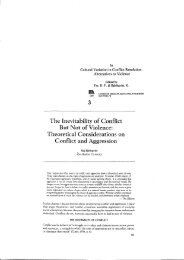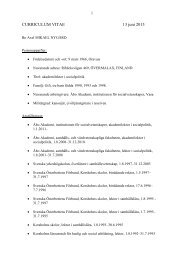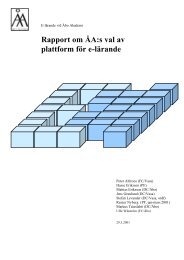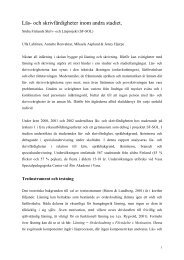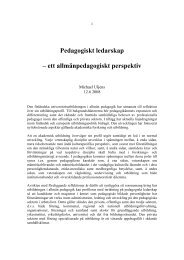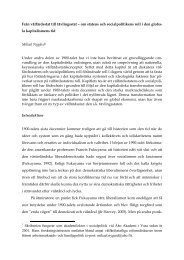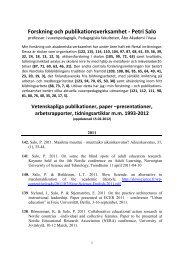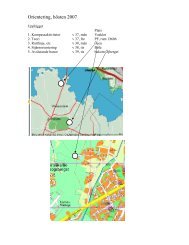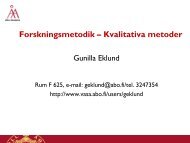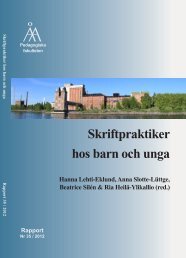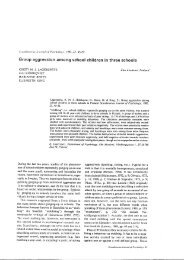Parties, Candidates and Citizens On-Line - Åbo Akademi
Parties, Candidates and Citizens On-Line - Åbo Akademi
Parties, Candidates and Citizens On-Line - Åbo Akademi
You also want an ePaper? Increase the reach of your titles
YUMPU automatically turns print PDFs into web optimized ePapers that Google loves.
would significantly enhance our underst<strong>and</strong>ing of the individual-level effects of on-line<br />
political activity.<br />
The results of the study generally support the reinforcement theory. The activity<br />
on three out of four party-associated discussion boards is exceptionally low. However, the<br />
National Coalition Party forum boasts a higher level of activity than the other party<br />
forums. Keeping the optimistic visions inherent in the mobilization scenario in mind, the<br />
marginal activity noted on the Centre Party’s member forum is clearly worrisome.<br />
Although the supporters of the Centre Party are not probably the most active internet<br />
users in Finl<strong>and</strong>, it still comes as quite a surprise that not even these politically interested<br />
party members are participating in on-line discussions. Likewise, it also comes as a<br />
surprise that the socialist parties with a history as mass-parties, i.e. the Social Democratic<br />
Party <strong>and</strong> the Left Alliance, lack on-line discussion boards altogether. Concerning this,<br />
one plausible explanation is that the parties are wary of electronic discussions as these<br />
might not necessarily present a positive picture of the party. For instance, Str<strong>and</strong>berg<br />
(2003: 82) found that the messages posted to the now shut-down SDP forum, in general,<br />
were negative <strong>and</strong> critical towards the party <strong>and</strong> its politicians.<br />
The findings concerning the discussions’ liveliness <strong>and</strong> intensity generally add<br />
more support to the pessimistic views of electronic politics. Even though the NCP forum<br />
displayed debates that were livelier <strong>and</strong> more intense than on the other parties’ forums,<br />
the overall levels of liveliness <strong>and</strong> intensity were exceptionally low. There were little, or<br />
virtually no traits of debates with interaction <strong>and</strong> exchange of ideas between many<br />
debaters. Seemingly, then, the electronic debates’ ability to inspire <strong>and</strong> deepen citizens’<br />
political engagement seems limited.<br />
The examination of the number of debaters on the discussion boards provided<br />
more indications of reinforcement, or lack of mobilization, on all party-associated forums.<br />
There seems to be little interest for electronic political debates among the Finnish<br />
citizens, as evident from the fact that a mere maximum of eight citizens participated in<br />
91.7 % of all discussion threads. However, one must bear in mind that the scope of this<br />
study is nonetheless limited. Hence, several arenas for electronic political discussion,<br />
besides those of political parties, have not been studied. In theory, the majority of on-line<br />
political discussion in Finl<strong>and</strong> might take place in completely different areas than<br />
expected. Thus, the conclusions of this study should not be over-interpreted. The study<br />
did, however, provide an insight into one political discussion board not associated with<br />
any of the political parties. The findings of the comparison between this political forum<br />
<strong>and</strong> a non-political counterpart on the web portal jippi.fi, generally support the<br />
reinforcement theory. A greater number of citizens were engaged in livelier <strong>and</strong> more<br />
intense discussions on the non-political discussion board than on the political discussion<br />
board. Since the surrounding context for the two forums is identical, the findings indicate<br />
161



